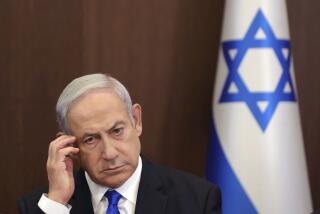Allies of Hussein to Face Hearings
- Share via
BAGHDAD — Three close associates of former President Saddam Hussein will move to the next stage of their legal cases before Christmas when investigative judges begin questioning them to gather facts for their trials, Iraqi government officials said.
However, the trials probably are many months away, sources close to the tribunal said, despite a top Iraqi leader’s announcement Tuesday that some would begin next week. Proceedings against Hussein are even further off, they said.
The three defendants whose cases will come up first are:
* Sultan Hashim Ahmad Jabburi Tai, former defense minister and commander of the 1st Corps of the Iraqi army;
* Ali Hassan Majid, known as “Chemical Ali,” accused of using chemical weapons against ethnic Kurds in the 1980s;
* Former Vice President Taha Yassin Ramadan.
Some Iraqi observers viewed the decision to press forward on the legal cases just six weeks before Iraq holds elections as a political move on the part of interim Prime Minster Iyad Allawi, who made Tuesday’s announcement.
However, Deputy Prime Minister Barham Salih defended the decision Wednesday.
He said that though politics played a role, it was hardly a precipitous decision because the first defendants to advance to this stage have known the essential facts of the cases against them for nearly six months.
“We have widows and victims asking us why we have been so patient with these guys and allowed so much time to pass,” Salih said.
The three cases have been delayed in part because of difficulty in finding attorneys for the defendants. Majid and Jabburi Tai were appointed Iraqi lawyers only a week ago and have met with them once. It is possible that at the first investigative hearings their lawyers will request additional time to prepare their clients for questioning.
The proceedings will start with Jabburi Tai because investigative judges think he may have information that is relevant to Majid’s case.
“We will give Saddam and his lieutenants a just trial, the kind of trial he denied Iraqis,” Salih said. “This will not be easy because there is so much anger, so much desire for revenge.”
The effort to build a case against Hussein will be more complicated, as has been evident in legal proceedings against other former dictators around the world.
A key element will be establishing that, as the country’s commander in chief, he was responsible for the work of his closest associates.
The process about to get underway is particular to Iraq. It represents an effort to fuse Iraqi and international law, and to protect the rights of the defendants -- a concept largely unknown in the political trials conducted during Hussein’s regime.
The Iraqi Special Tribunal, which will handle the trials, deals only with cases that involve war crimes and crimes against humanity committed during the Hussein era.
The first step in the process took place in July when Hussein and his 11 associates were notified of the potential charges against them.
In the investigative hearing stage, which is about to begin, an investigative judge questions under oath the suspect as well as alleged victims and witnesses about the alleged crimes. The suspect has a right to counsel and has the right to remain silent.
Under the law, the investigative judge has an obligation to search for both incriminating and exculpatory evidence. This stage is closed to the media.
However, the Iraqi government has urged the court to allow international monitorsSalih said.
When the investigative process is complete, the judge must decide whether to file an indictment. Once an indictment is filed, a case proceeds to trial.
The defendant has the right to appeal the trial verdict to an appellate panel.
The investigative stage can take some time, depending on whether the suspect answers the questions or remains silent and on the number of appeals lodged by his lawyer.
These may be only the first in several trials of the same figures. Both Kuwait and Iran have said they would be interested in prosecuting Hussein and some of his lieutenants.
More to Read
Sign up for Essential California
The most important California stories and recommendations in your inbox every morning.
You may occasionally receive promotional content from the Los Angeles Times.













